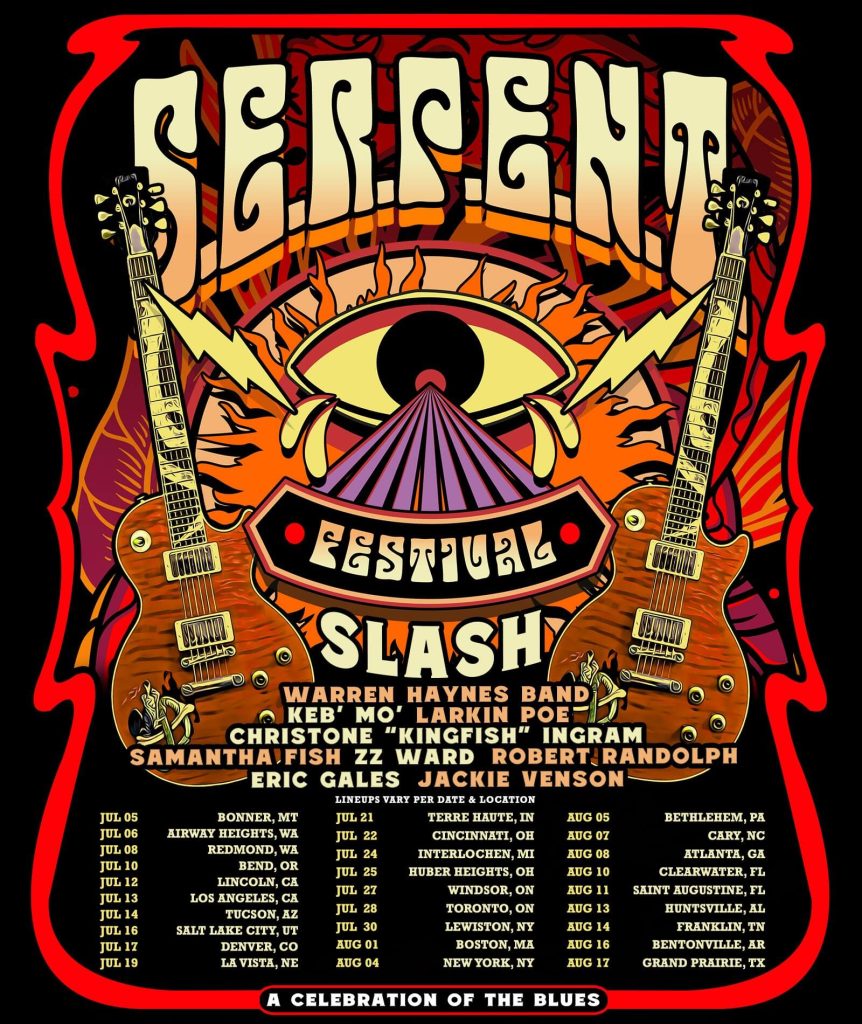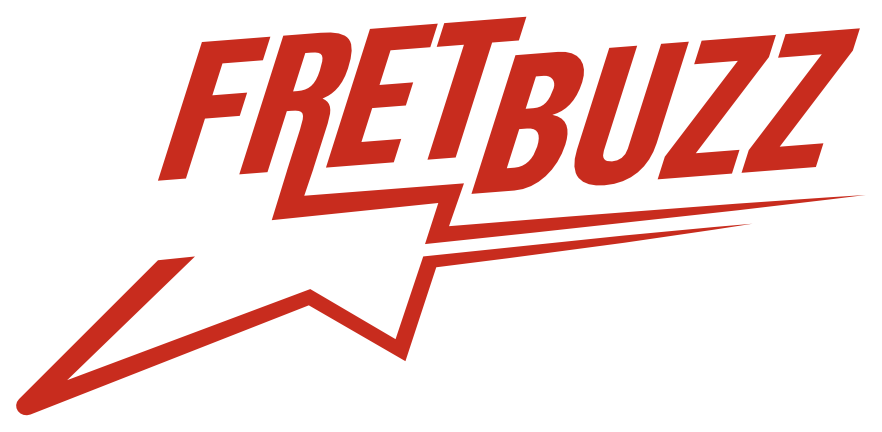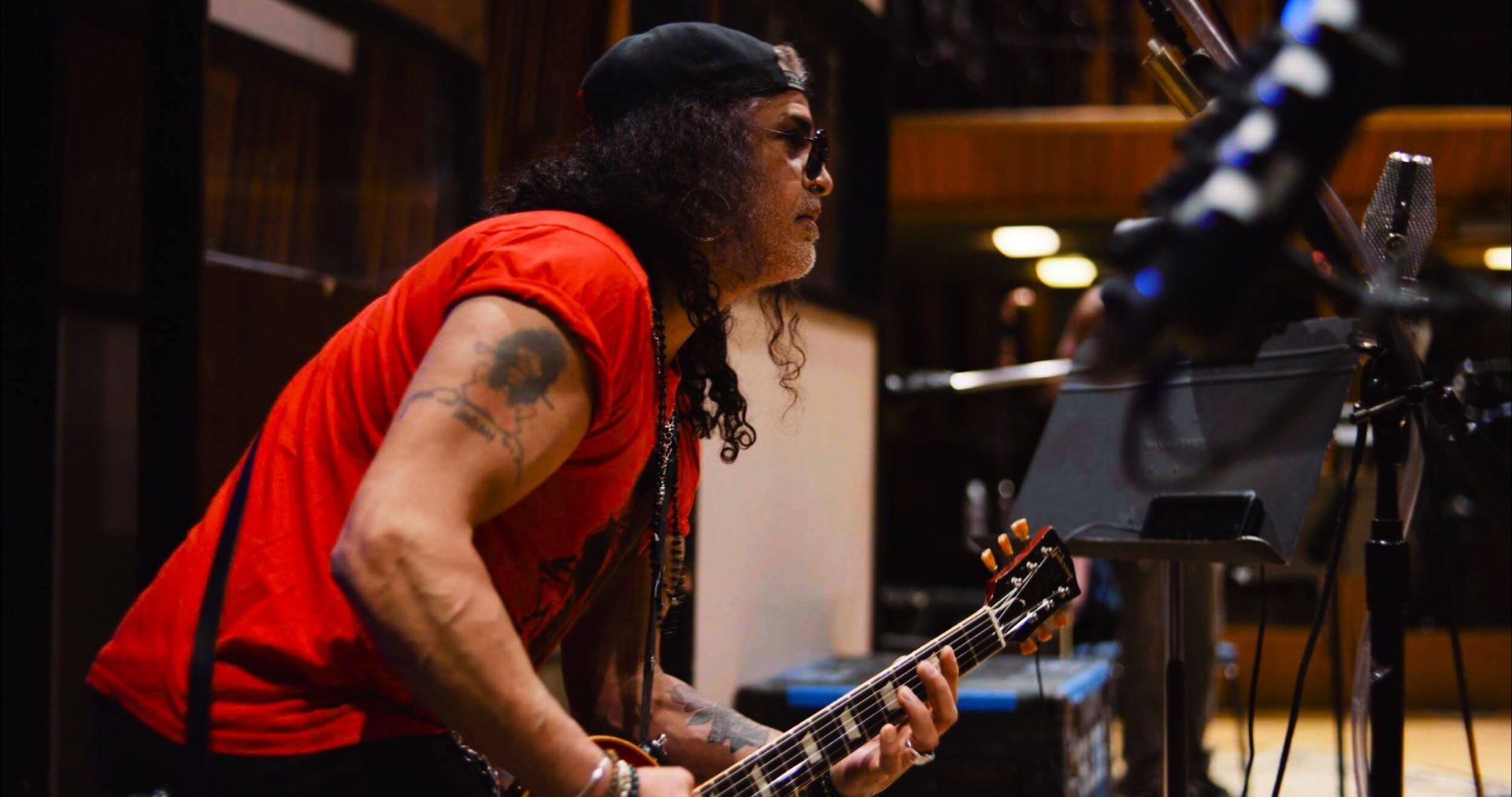Over his career, Slash has played blazing metal, irreverent punk, searing rock and roll, and heartrending pop, but at the core, he’s always been a blues guitarist. On his sixth solo album, Orgy of the Damned, Slash pays homage to many of his greatest influences with a vibrant homage to the blues. The album contains 12 dynamic, stripped-down songs that offer a nostalgic nod to the past while reinvigorating the songs with his inimitable guitar playing and the spirit of collaboration. The album celebrates both well-known and largely undiscovered blues songs that could soon be new staples of the genre.
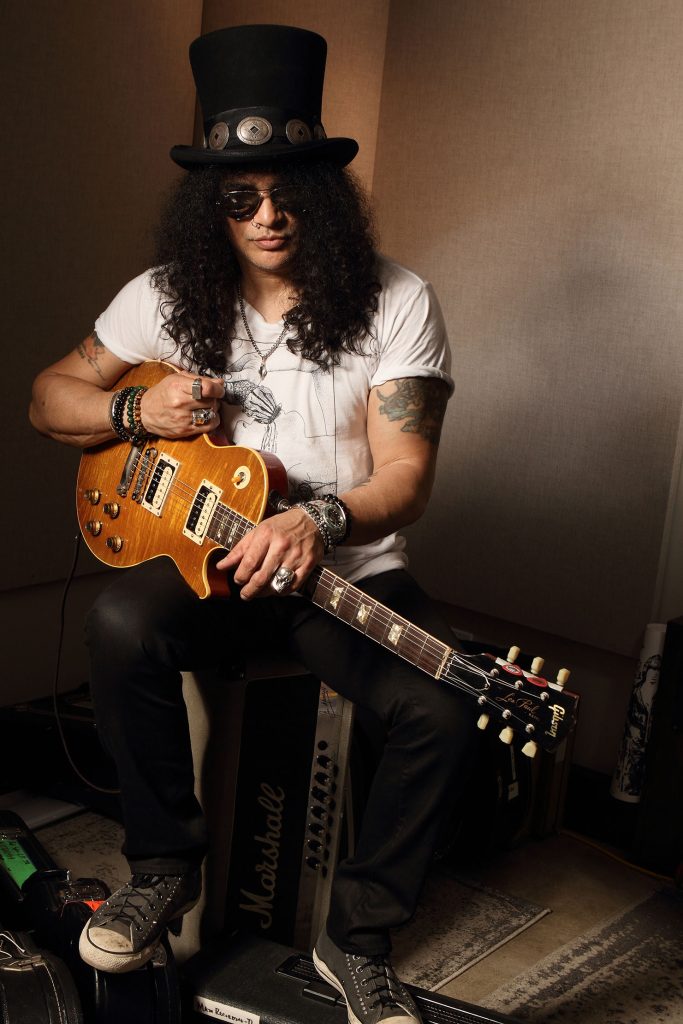
Orgy of the Damned was produced by Mike Clink and features a diverse group of guests, including Gary Clark Jr., Billy F. Gibbons, Chris Stapleton, Dorothy, Iggy Pop, Paul Rodgers, Demi Lovato, Brian Johnson, Tash Neal, Chris Robinson, and Beth Hart. Slash also reunited with two of his bandmates from his Blues Ball outfit in the 90s, bassist Johnny Griparic and keyboardist Teddy ‘ZigZag’ Andreadis, and brought on drummer Michael Jerome and singer/guitarist Tash Neal.
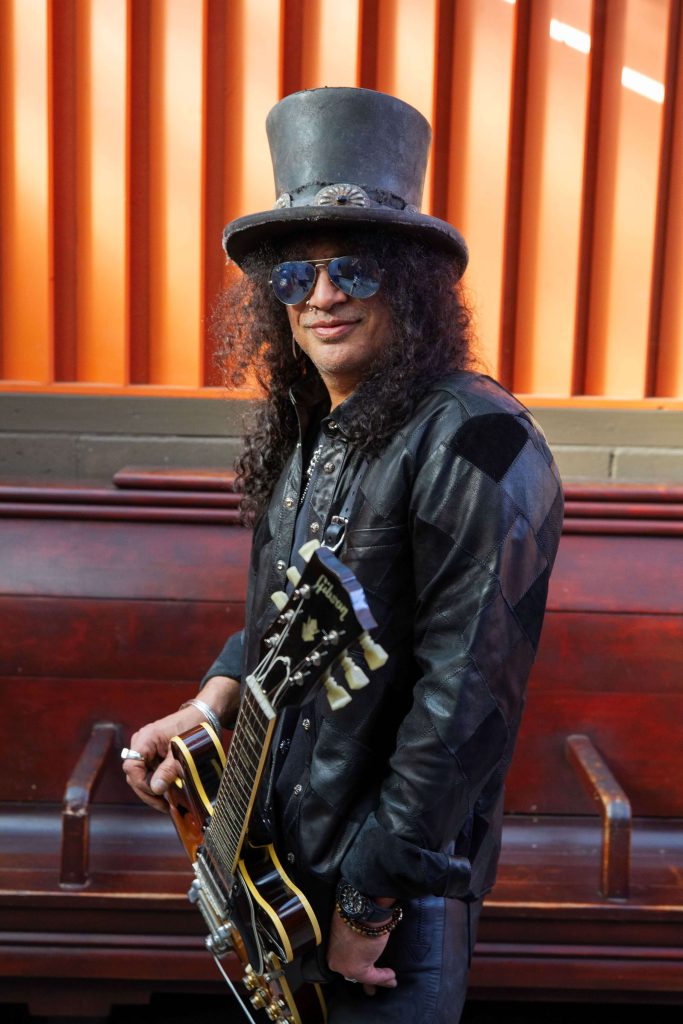
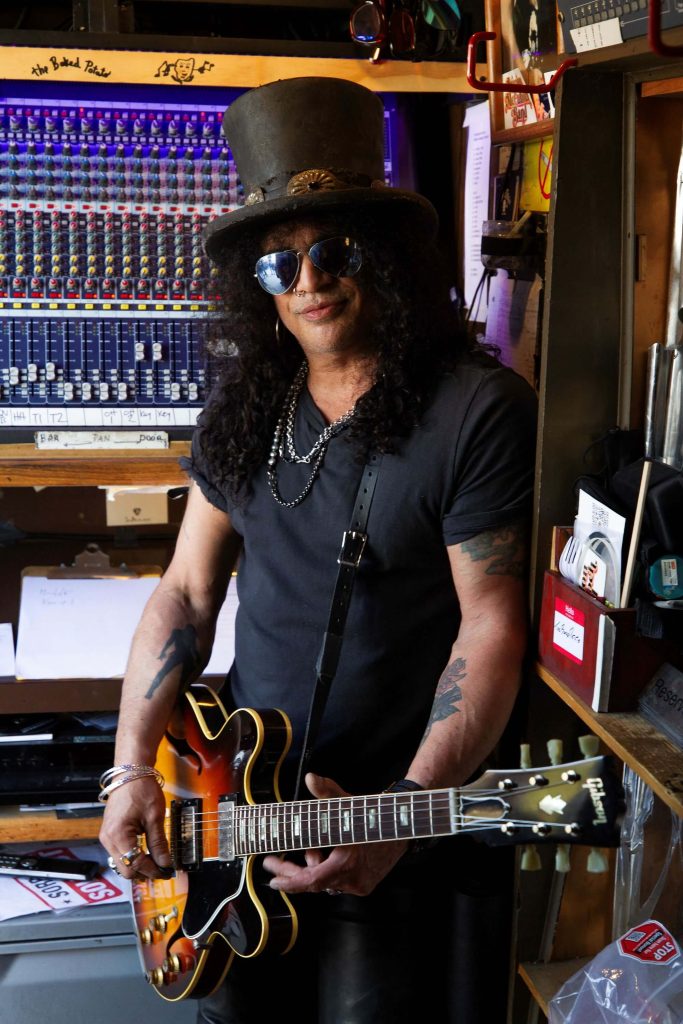
Photo Credit: Gene KirklandAs with Slash’s last studio album, Slash Myles Kennedy 4, the songs on Orgy of the Damned were played live in the room, with an emphasis on improvisation, which resulted in a collection of energized songs that are vital and raw. Highlights include a cover of the early Peter Green/Fleetwood Mac tune “Oh Well” with outlaw country artist Chris Stapleton, and the Howlin’ Wolf-penned first single “Killing Floor,” an electrifying collaboration with AC/DC vocalist Brian Johnson and Aerosmith’s Steven Tyler on harmonica.
“Hoochie Coochie Man,” written by Willie Dixon and made famous by Muddy Waters, showcases the unrestrained energy of Z.Z. Top guitarist Billy F. Gibbons on guitar and vocals, Gary Clark Jr. joins Slash for a rockin’ take on Robert Johnson’s “Crossroads,” and Beth Hart joins in on the twangy, and soulful cover of T. Bone Walker’s “Stormy Monday.” Slash’s Blues Ball have previously performed some of the songs on Orgy of the Damned, including Steppenwolf’s “The Pusher,” Charlie Segar and Big Bill Broonzy’s “Key to the Highway,” and Albert King’s “Born Under a Bad Sign,” while others, like Stevie Wonder’s “Living for the City,” have been longtime favorites of the guitar hero. Slash recently offered an in-depth track-by-track for the album.
“The Pusher” featuring Chris Robinson of The Black Crowes on vocals and harmonica.
Written by Wayne Hoyt Axton
Slash: “The Pusher” is an old Steppenwolf song. Yeah, I’ve always loved Steppenwolf, but I particularly like this song, and it was a song that we used to do in Slash’s Blues Ball back in the 90s. I definitely wanted to bring it back around and it’s a good example of a song that’s not a standard blues song. It’s a 60s rock-and-roll-sort-of-drug-song. Anyway, I had the idea to do it and Chris Robinson was the first guy that I brought into the studio, and he was totally down to do it. He came into the studio and brought his harmonica and we did three different takes, all entirely different, and just played the harmonica and vocals live. We took the one that we liked the best and that was it.
“Crossroads” featuring Gary Clark Jr. on vocals, rhythm guitar/solo.
Written by Robert Leroy Johnson
Slash: Originally, we had talked about doing the Robert Johnson version of this song, which was a diverse thing, but as I started to get into it, I realized I wanted to do a more electric version, so I started to sort of go more along the lines of the live Cream version. It’s definitely influenced more by Cream and their sound. I met Gary Clark Jr. a few years ago and he’s probably one of the best young blues guitar players to come along in a really long time – a soulful, emotive guitar player and vocalist. Gary came down to the studio and we kept the whole live version with our blues band, and then he did a killer vocal.
“Hoochie Coochie Man” featuring Billy F. Gibbons of ZZ Top on vocals, rhythm guitar/solo.
Written by Willie Dixon
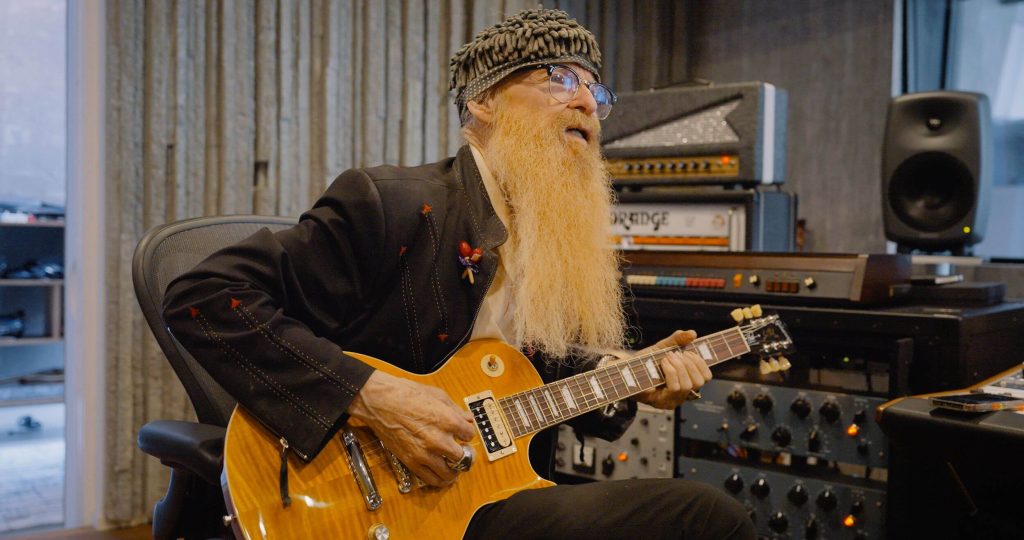
Slash: This is one of the sexiest songs, well, all of the Muddy Waters material is. One of the great things about Muddy Waters was there was a certain sexual quality to his voice, his tone, and his cadence. Then he added this insane fucking rhythm section that was just like, I don’t know, I can’t think of any music that’s really (excuse my French), but that you want to fuck to more. And, anyway, so I wanted to cover this particular song, but do it in a unique way… Because it’s a commonly covered riff and so many people have their own take on this particular very, very simple tune. It’s a rhythm and a certain kind of very simple three-note pattern. We did a version of it that was as close to the original vibe that the Muddy Waters thing had. Our drummer who played on this record is Michael Jerome, and he’s got that groove really, really down and he was the perfect drummer to be able to put this together. Once the music was basically done, I’d always thought about Billy Gibbons doing the vocals. I chased Billy down and he added the vocals and some guitar in a studio in Palm Springs. That’s how it all came together. It’s very live – a very live-sounding track, which is really cool. It sounds like you’re in a bar somewhere. I had Les Stroud play on harmonica. He’s a friend of mine and he was always talking about his harp playing and it turns out he’s a really fucking accomplished harp player. So, Les came down to our studio and put the harp on it.
“Oh Well” featuring Chris Stapleton on vocals.
Written by Peter Alan Green
Slash: So, this is the original Fleetwood Mac, which was founded by Peter Green, one of the greatest singer-songwriter-guitar players. He’s less known in the public, but very well known to us guitar players re the 60s British blues, and he’s up there with Eric Clapton, Jeff Beck, and Mick Taylor. He sort of had a misadventure with drugs and disappeared early in his career, but he had some great fucking songs, and ‘Oh Well’ is one of my favorites. I remember hearing the song on the radio when I was probably 13. They used to play both the older version of Fleetwood Mac and the new version of the band with Stevie Nicks and Lindsey Buckingham a lot. I always loved this song, and it’s a great guitar riff. I jammed it with the Blues Ball back in the ‘90s, and I’ve played it live here and there. I knew from the beginning I wanted to do the song on this record. It was also one of the songs that I was trying to figure out who would be the right vocalist for it, and one of the ideas I had was Chris Stapleton, who is one of the most brilliant singer-songwriters today. He’s also got such a gritty and distinctive voice, so I called him up and he did an amazing job. I mean, his voice is so cool.
“Key to the Highway” featuring Dorothy on vocals.
Written by Charles Segar, William Broonzy
Slash: This is one of the blues standards that I’ve been playing with Johnny and Teddy in our blues band since we first hooked up way back in like 1997 or ‘96 maybe. It was the first song on my list of songs to do for this record. The original was done by Freddie King, and we stayed somewhat true to the original, arrangement-wise. We kick the tempo up a little bit just to make it rock a little harder. It’s a very open-ended type of a one, four, five blues progression, but it’s got a little bit of a swing to it. It’s just a cool song. And then I asked Dorothy, who’s this great American blues and rock singer, who has a distinctive raspy and soulful voice, to sing it. Dorothy came in and did a kickass job on it. There’s a lot of different versions of the song out there, so I sent her some of the ones that I liked, and she came up with her own version of the vocal approach for the song and it came out amazing.
“Awful Dream” featuring Iggy Pop on vocals
Written by Sam (Lightnin’) Hopkins, Clarence Lewis, C. Morgan Robinson
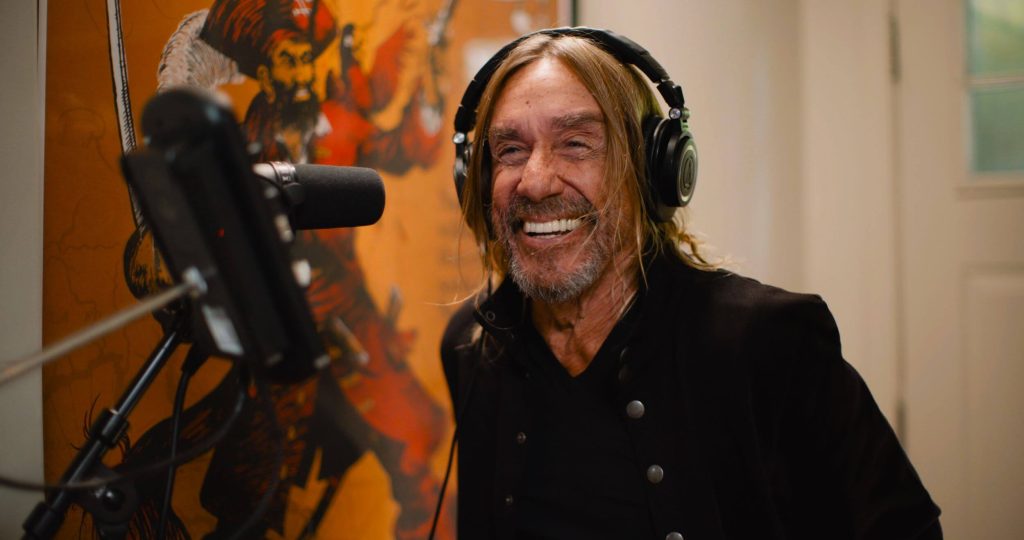
Slash: Oh, now, this is an interesting story. When I got the Blues band back together, I had an idea for the overall feel and the vocalists in my head for the whole thing, and as we went from song to song, we found the right fit. In our conversations about singers, Iggy Pop is somebody that I’ve been friends with and worked with for many years, and I really have the utmost admiration and respect for him. Johnny, our bassist, mentioned that Iggy said in an interview he’d like to do something in the blues genre. I’d never heard that, so I called Iggy, and we talked about the record. Since I didn’t have a song earmarked for him yet, I asked him if there was a particular song he would like to do, and he said ‘Awful Dream’ by Lightnin’ Hopkins. Listening to the original track, I imagine it’s Lightnin’ Hopkins sitting on a stool with an acoustic with a pickup, and a very old school, primitive version of an electric-acoustic, and then there’s someone in the background playing very loose drums, and you can tell it’s a one-take almost made up on the spot recording. So, I very loosely learned that version. Iggy came to my studio in L.A., and we just sat down, he was on one stool, and I was on another, and I had my man, Michael Jerome come in and play some drums, and we just grabbed the tape live. So, it’s really, really very cool, and spontaneous. Iggy’s interpretation of that song is actually sort of sublime. And I think it’s something that nobody’s ever heard from him. Then there’s something cool on it at the very end of the track. We’re just playing the vamp out and I have my headphones on and I’m hearing this thing that sounds like a harmonica and I turn around and it’s Iggy singing the harmonica parts. It is really cool. So yeah, that was a very special moment on the record.
“Born Under a Bad Sign” featuring Paul Rodgers on vocals.
Written by William Bell and Booker T. Jones
Slash: One of my favorite all-time favorite Albert King songs, and one of the coolest blues rock riffs that I grew up listening to ‘Born Under a Bad Sign’ was a no-brainer and we did our own version of it and created our own arrangement. Then Paul Rogers, who is somebody I’ve worked with before and is a good friend, came into the studio. You know, he’s got the most amazing blues voice, he’s somebody that everybody in the 60s in England admired. Paul is a top blues vocalist, he was in Free and went on to do Bad Company, and then he did a bunch of different things after that. I asked him if he would sing it, and he did an amazing job. I can’t even say amazing job—it’s just so perfect.
“Papa Was a Rolling Stone” featuring Demi Lovato on vocals
Written by Barrett Strong and Jesse Norman Whitfield
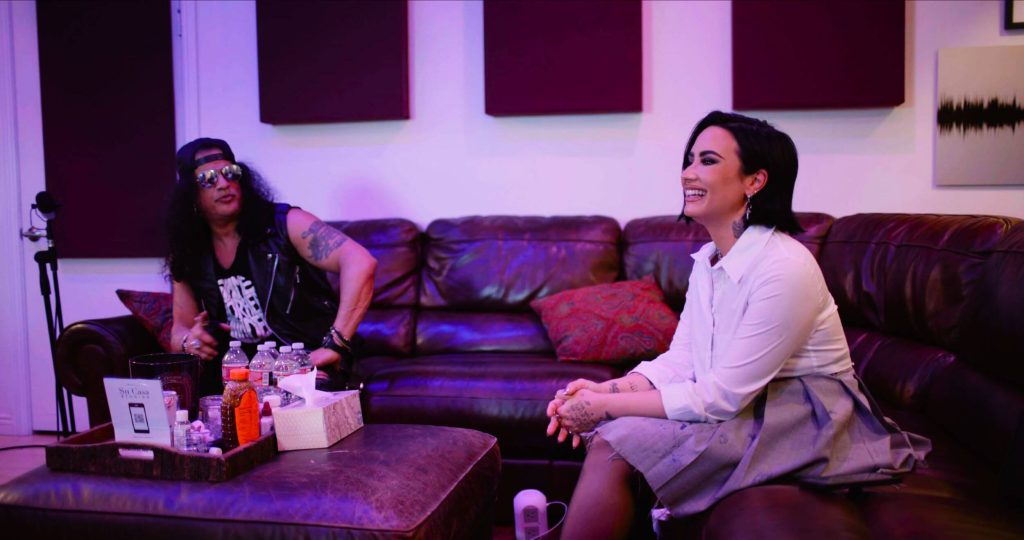
Slash: This song is the most left-of-center for a sort of blues cover record because it’s a song by The Temptations, which is really R&B. From 1972, I grew up with this song and it was a really popular song in the early ‘70s when I was a kid. It’s a cool song and an adventure in and of itself. The original version is super long, as in 10 minutes long, if not longer. And it’s got this amazing instrumental arrangement to it. I mean, the whole song is amazing. We used to jam it back in the 90s with another band that I had called Snakepit. Johnny Griparic, our bass player, was also in. So, I definitely wanted Demi to do this song because the subject matter of the song is basically about the unsavory habits of an absent father who eventually passes away that the kids are asking their mom about, as in ‘What’s this about our dad that we’ve never met, and we hear all these stories about?’ It’s a very dark and personal kind of subject matter, therefore whoever sings it can’t just cover it for the sake of covering it, they have to be able to relate to it in some way. I’ve been friends with Demi Lovato for a few years now and I wanted a strong female voice to sing it. She has that really young and powerful voice that has this kind of, not an entirely innocent delivery, but definitely an almost childlike quality to it. I asked her to do it because Demi’s had some interesting stories in her past and she jumped at the idea. I had no idea how she was going to react to the question, but she totally knew and related to the song. Demi came in and did an amazing job. It was really, really fun to do this song with her.
“Killing Floor” featuring Brian Johnson of AC/DC on vocals
Written by Chester Burnett (Howlin’ Wolf) *With special guest Steven Tyler of Aerosmith on harmonica
Slash: “Killing Floor” is by Howlin’ Wolf, one of the giants of American blues. He had a very sort of cool and unique style and sound, and ‘Killing Floor’ is only one of his most well-known songs. It’s been covered quite a few times, but it’s a great guitar riff and it’s a solid groove and I’ve always wanted to cover that. It’s a little bit of a different arrangement than the original, it is actually a combination of two of his songs, it’s “Killing Floor” and then there’s a touch of a “Spoonful” guitar riff in there as well, two of my most favorite riffs. In trying to figure out who to sing it, I wanted somebody who had a nice, gruff voice for it. And Brian Johnson from AC/DC was the first that came to mind, and he said, ‘Yeah, come on down and we’ll do it’. I went to Florida with my producer and Brian fucking ripped out a killer version of “Killing Floor.” Instead of doing it in his characteristic AC/DC voice, he did it an octave lower. Which is great because that’s really how the song is. If he’d sung it the other way it would have probably been better if AC/DC did it, so it worked out really great. Steven Tyler of Aerosmith came down to the studio in L.A. and I played it for him, and he wanted to be on it. So, he grabbed his harmonica and jumped into the studio and played on it. It was very spontaneous and great. He sort of has a vocal on there. He screams in between playing the harp, it’s really cool. It’s definitely capturing a moment and I walked away proud that I managed to get that.
“Living for the City” featuring Tash Neal on vocals
Written by Stevie Wonder
*With special guest background vocals: Jenna Bell and Jessie Payo
Slash: “Living for the City” is a Stevie Wonder song, and another song that I grew up with. There was a period in my childhood where Steve Wonder was definitely the background music, and he was all my Mom played. ‘Living for the City’ was one of my favorite songs, and it stuck with me. Lyrically, there’s some different things happening in that song, a story being told, and then towards the end of the song musically it breaks down and it goes into the sound of the city in New York and the main protagonist of the story gets arrested. It gave me this visual in my mind and it always stuck with me. The fun thing about doing this record, was that we could do whatever the fuck we wanted. Back in the 90s we did a version of Steve Wonder’s “Superstition,” and I didn’t want to do that because that song has been covered to death. So, the idea of doing a Stevie Wonder song wasn’t like, ‘Oh, we have to do a Stevie Wonder song. I said, Well, let’s do another song that I liked.’ We truncated the arrangement a little bit, so it’s a little shorter than the original. We didn’t try and emulate the city sounds or make it sound like the original version. But Tash Neal, who sings and plays guitar on the whole record and the forthcoming tour, did a fucking fantastic job singing this song. So yeah, I’m really happy with it. It’s definitely something, and if “Papa was a Rolling Stone” was unexpected, this song will be even more so.
“Stormy Monday” featuring Beth Hart on vocals
Written by T-Bone Walker
Slash: This is one of the pretty famous blues standards, and I think most people are familiar with the Etta James version of it, which was from the 60s. There’s been many versions of this song, but I was always pretty taken by the Etta James version, so it was a song I knew I wanted to do. The Allman Brothers also did a great version as well and we played it back in the 90s with Blues Ball, and I just loved soloing on it and whatnot. I immediately thought of Beth Hart, who’s a fucking amazing American blues vocalist and she has been around for a little while. Everybody loves to play with Beth because she’s this ferociously emotional female vocalist that just lays it all on the fucking table when she sings. I asked her to do it and she said, ‘Yeah, I would love to do it, but let’s do it in a minor as opposed to the original, which is major.’ So that just took the song in a whole different color, and it makes our version very original, but it’s also really, really effective. She came in and did this song in one take and collapsed on the floor when she was done. It was right when we were actually in the studio, doing the live tech in that first week. We’re in there and she comes in and I think the band had played the song one time by itself, and then Beth got there, and we went into it. And that was it and we knew we could not top that phenomenal first take with her.
Metal Chestnut Written by Slash
Slash: It’s not a cover and there’s no one singing. ‘Metal Chestnut’ is an instrumental and I wrote it specifically for Orgy of the Damned because Mike Clink our producer said, ‘Well hey, you don’t have anything that you’ve written for the record.’ I hadn’t even thought about it, so I went home, wrote something, and brought it back and started to jam the song with the band. It’s just a real simple tune that came together quickly and organically. It wasn’t forced, but I didn’t specifically have it in my mind to write something. I wrote this one quickly and then put the guitars on it at my studio. It’s a very honest and emotional little piece.
